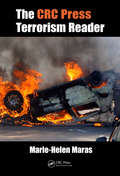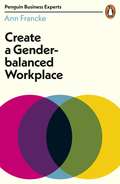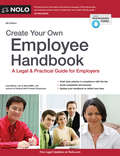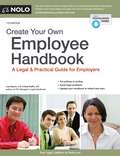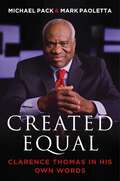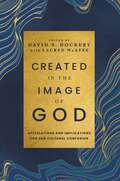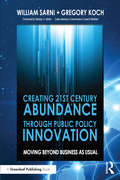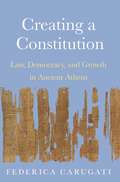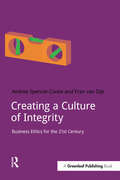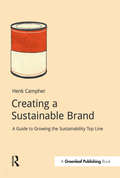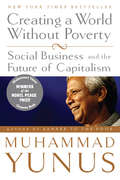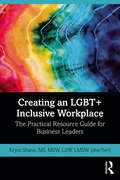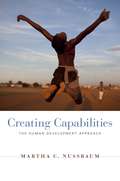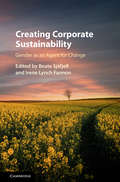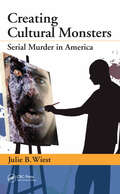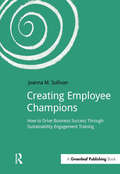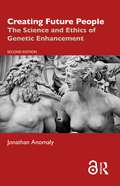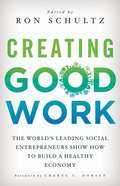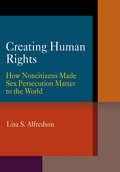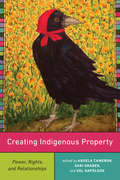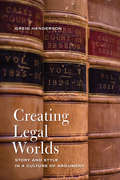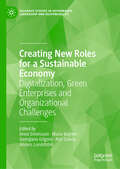- Table View
- List View
CRC Handbook of Management of Radiation Protection Programs, Second Edition
by Kenneth L. MillerCRC Handbook of Management of Radiation Protection Programs, 2nd Edition, is unique in that it offers practical guidance for managing various aspects of radiation protection programs ranging from the daily operation of a health physics office to the preparation of radiation experts for court appearances as professional witnesses. The book also covers such topics as organization and management of nonionizing radiation safety programs (with special emphasis on laser safety programs) and management of radioactive waste, personnel monitoring programs, radiation accident victims, internal exposure, relative radiotoxicity and radiation therapy patients. Other chapters discuss handling radiation accidents and education and training requirements for radiation protection. Legal aspects covered in the book include the history of radiation court cases, legal implications of record keeping, and preparation for court appearances. CRC Handbook of Management of Radiation Protection Programs, 2nd Edition will be a valuable reference resource for medical and health physicists, industrial hygienists, physicians, nuclear engineers, radiation protection regulators, radiation emergency management agents, radiation safety committees, and managers of facilities using ionizing and nonionizing radiation sources.
The CRC Press Terrorism Reader
by Marie-Helen MarasFrom CRC Press's unrivaled pool of author experts comes the ultimate reader on terrorism. With information drawn from premier titles in the CRC Press collection, it focuses on how to prepare for, mitigate, counter, and respond to terror threats and acts. Policy issues, critical infrastructure protection, terrorism funding, and target selection is discussed, along with weapons of mass destruction, intelligence and antiterrorism efforts, terrorism crisis management, and responder issues. The book goes beyond theory to provide practitioner knowledge from the field straight into the reader‘s hands, delivering real-world solutions to terrorist threats and acts at home and abroad.
Create a Gender-Balanced Workplace (Penguin Business Experts Series)
by Ann FranckeEquality at work expert Ann Francke reveals how to understand and tackle the damaging consequences of gender imbalance in the workplaceGender balance is first and foremost a business issue. McKinsey estimates we could add 28 trillion to global GDP if we achieved gender equality everywhere - that is more than the GDPs of the US and China combined. But it's so much more than that. Gender balance is one of the best levers we can pull to build better managers and leaders at every level, improve team performance and create better cultures where everyone can thrive.In the Penguin Experts: Create a Gender-Balanced Workplace, Ann Francke, the CEO of the Chartered Management Institute (CMI), introduces her solution to combating the problems at the heart of the continued imbalance and offers clear, actionable strategies for making a positive change in your organisation.
Create Your Own Employee Handbook: A Legal & Practical Guide for Employers
by Amy Delpo Lisa GuerinMake—or update—your employee handbook today with this user-friendly guide! Every company should have an employee handbook to communicate with employees, manage workers effectively, ensure consistent treatment across the organization, and protect itself from lawsuits. But creating a handbook from scratch can be daunting—and hiring a lawyer to draft one can easily cost thousands of dollars. That where Create Your Own Employee Handbook can help. It provides everything managers or HR professionals need to create an effective handbook—or update an existing one—all in plain English. Inside, you’ll find up to date legal information, practical suggestions, and policy language on: wages and hours at-will employment time off discrimination and harassment email, social media, mobile devices, and other workplace technology drugs and alcohol complaints and investigations workplace privacy, and much more. The 8th edition is completely updated to include state law changes affecting employer policies, such as meal and rest breaks; minimum wage laws (including rules for restaurant servers and other employees who receive cash tips); smoking in the workplace; drug and alcohol testing; discrimination; jury duty; family and medical leave; and much more. The 8th edition also covers the latest rules and practices for workplace technology (including employee posts on personal or business social media sites and use of employee-owned smart phones for work).
Create Your Own Employee Handbook
by Lisa Guerin Amy DelpoCreate a handbook for employees, spelling out your company's benefits, policies and procedures using this practical legal guide Every company, no matter how big or small, needs to provide workers with an employee handbook. Create Your Own Employee Handbook gives you the information and policies all managers, HR professionals and business owners need to create their own reader friendly guide, no matter what state you live in. Each chapter covers a different topic, including: . at will employment . hiring . pay and payroll . workdays and hours . performance evaluations . benefits . discrimination and harassment . complaints and investigations . leave . health and safety . substance abuse . privacy in the workplace . discipline You'll get the lowdown on the legal and practical considerations that apply to each topic in your state, plus sample policies that you can use as is or tailor to meet your needs. You can even cut and paste the language you need to complete your own handbook instantly. This edition is completely updated to reflect recent changes to federal and state law, and covers emerging workplace issues such as healthcare reform law and social networking policies. Download forms for book at nolo.com.
Created Equal: Clarence Thomas in His Own Words
by Michael Pack Mark PaolettaDrawing on historical documents and exclusive interviews, authors tell the inspiring story of Clarence Thomas's rise from a childhood of poverty and prejudice in the segregated South to Supreme Court Justice. Companion to blockbuster documentary Created Equal: Clarence Thomas in His Own Words, but a fascinating stand alone read, as well!*The full story behind the wildly successful documentary film, Created Equal: Clarence Thomas in His Own Words* Born into dire poverty in the segregated South and abandoned by his father as a child, Justice Clarence Thomas triumphed over seemingly insurmountable odds to become one of the most influential justices on the Supreme Court. Yet after three decades of honorable service, few know him beyond his contentious confirmation and the surrounding media firestorm. Who is Justice Clarence Thomas, in his own words? In the follow-up to the wildly successful documentary by the same name, Created Equal builds on dozens of hours of groundbreaking, one-on-one interviews with Thomas to share a new, expanded account of his powerful story for the first time. Producer Michael Pack and Mark Paoletta, a lawyer who worked alongside Thomas during his confirmation, dive deep into the Justice&’s story. Drawing on a rich array of historical documents and unreleased conversations with Thomas, his wife, and those who knew him best, Created Equal is a timeless account of faith, race, power, and personal resilience.
Created in the Image of God
by Dr. David DockeryAll people have dignity because they are created in the image of God. This theological belief has been a liberating force among its believers, providing a myriad of beautiful implications in our world. On the other hand, where the idea of being created in God&’s image has been misunderstood, the implications can be devastating. Created in the Image of God brings together leading experts to discuss what it means to be made in image of God and to bring clarity and guidance for implications in the midst of our cultural confusion. The overall approach of this work, though distinct and focused in each of the chapters, reflects a consensus understanding that men and women have been created in God&’s image, that they have fallen and are influenced by sin, that Christ has provided redemption through his vicarious death and resurrection, and that there is hope in the promise of eternal life in Christ. Christ succeeded where Adam failed (Rom 5:12-21; 1 Cor 15), allowing those who trust in him to enjoy and glorify him forever. The rich chapters within, and their helpful application to human dignity issues, will help our world to regain a sense of the marvelous privilege that is ours as image bearers and how that should impact our engagement with complex dignity issues of our day.
Creating 21st Century Abundance through Public Policy Innovation: Moving Beyond Business as Usual
by William Sarni Greg KochOne of the greatest challenges of the 21st century is the problem of how the public and private sectors can sustain economic development, business growth, social well-being and ecosystem health in the face of accelerating demand for water, energy, and food. "Business as usual" projections of scarcity in water, energy, and food predict a lack of these resources sufficient to sustain economic and business growth as well as an adequate standard of living worldwide. Developments in technology are well documented, but this is the first book to explain the role of innovation in public policy and governance, a topic which is frequently overlooked and often frustrates developments in technology and business. Without innovation in public policy and governance, innovation in technology solutions will face persistent headwinds for adoption. The book showcases these innovations and creates a roadmap of what needs to change to drive economic development, business growth, social wellbeing and ecosystem health in the 21st century.
Creating a Constitution: Law, Democracy, and Growth in Ancient Athens
by Federica CarugatiA comprehensive account of how the Athenian constitution was created—with lessons for contemporary constitution-buildingWe live in an era of constitution-making. More than half of the world's constitutions have been drafted in the past half-century. Yet, one question still eludes theorists and practitioners alike: how do stable, growth-enhancing constitutional structures emerge and endure? In Creating a Constitution, Federica Carugati argues that ancient Athens offers a unique laboratory for exploring this question. Because the city-state was reasonably well-documented, smaller than most modern nations, and simpler in its institutional makeup, the case of Athens reveals key factors of successful constitution-making that are hard to flesh out in more complex settings.Carugati demonstrates that the institutional changes Athens undertook in the late fifth century BCE, after a period of war and internal strife, amounted to a de facto constitution. The constitution restored stability and allowed the democracy to flourish anew. The analysis of Athens's case reveals the importance of three factors for creating a successful constitution: first, a consensus on a set of shared values capable of commanding long-term support; second, a self-enforcing institutional structure that reflects those values; and, third, regulatory mechanisms for policymaking that enable tradeoffs of inclusion to foster growth without jeopardizing stability.Uniquely combining institutional analysis, political economy, and history, Creating a Constitution is a compelling account of how political and economic goals that we normally associate with Western developed countries were once achieved through different institutional arrangements.
Creating a Culture of Integrity: Business Ethics for the 21st Century (Doshorts Ser.)
by Andrea Spencer-Cooke Fran van DijkFor companies, unethical business practices like bribery and corruption pose major business risks, and can result in fines, reputational damage, lost business opportunity and – increasingly – criminal or civil charges.Organizations have responded to this critical governance issue with rigorous formal integrity and compliance frameworks, to set out and enforce standards for ethical business practice. But companies also need to create an enduring culture of integrity that establishes doing the right thing as the cultural norm across the organization – and this requires more than compliance alone.Creating a Culture of Integrity identifies the key actions sustainability and compliance officers can take to foster this cultural shift within their organizations.This "one-stop" toolkit for embedding integrity also includes: inspiring best-practice case studies from companies who’ve implemented culture change, with insights on how they deal with ethical dilemmas when these arise and; powerful arguments to help you make the business case for building a strong ethical culture around your compliance system.
Creating a Sustainable Brand: A Guide to Growing the Sustainability Top Line (Doshorts Ser.)
by Henk CampherSustainable brands may have started as "doing less harm" and shaving costs off the bottom line. But brands today, supported by over a decade of phenomenal changes in sustainability, are looking for the holy grail of sustainable business – a fusion of products and branding that can actually drive sustainability and grow the business top line.Consumers have already joined the party. Just look at TOMS, Patagonia, Method, Seventh Generation, Dove and many more. What is missing isn’t the consumer but a better understanding of what fully-rounded consumers really want in their quest for a healthy, fulfilling life.This guide by sustainable brand expert Henk Campher is the model for creating a sustainable brand that people can trust, buy and above all, advocate for. Campher cuts through the myths and noise to offer an experienced expert's 101 for creating an irresistible brand, clearly setting out: what makes a product or service sustainable; the basic elements of sustainable branding strategy and a deep understanding of how consumers connect with a brand; an original model for assessing the sustainability of your brand, and; a host of examples of sustainable brands, drawing on the author's firsthand experience as part of the team at Edelman and Oxfam and founder of the Nelson Mandela initiated Proudly South African campaign.
Creating a World Without Poverty: Social Business and the Future of Capitalism
by Muhammad YunusIn this newly updated national bestseller, Nobel Peace Prize?winner Muhammad Yunus outlines his vision of a new business model that combines the power of free markets with the quest for a more humane world.
Creating an LGBT+ Inclusive Workplace: The Practical Resource Guide for Business Leaders
by Kryss ShaneSetting out best practices and professional guidance for creating LGBT+ inclusive workplaces, this approachable and easy to follow book guides current and future leaders of all industries toward appropriate and proven ways to create safer working environments, update company policies, enhance continuing education and training, and better support LGBT+ people in the workplace. Featuring real-life situations and scenarios, a glossary, and further resources, Creating an LGBT+ Inclusive Workplace enables professionals in all aspects of professional roles to integrate foundational concepts into their everyday interactions with staff at all levels as well as within the community to create an overall workplace culture that nurtures a welcoming, inclusive, and affirming environment for all. This book includes postcards from PostSecret as its foreword and more than a dozen exclusive interviews from the world’s top leaders in a variety of industries with world-renowned reputations. Enabling professionals in a variety of business roles to create an overall workplace culture that nurtures a welcoming, inclusive, and affirming environment for all, this book is an essential resource for independent readers, department teams, and entire corporations.
Creating Capabilities: The Human Development Approach
by Martha C. NussbaumIn this powerful critique, Martha Nussbaum argues that our dominant theories of development have given us policies that ignore our most basic human needs for dignity and self-respect.
Creating Capabilities: The Human Development Approach
by Martha C. NussbaumIf a country’s Gross Domestic Product increases each year, but so does the percentage of its people deprived of basic education, health care, and other opportunities, is that country really making progress? If we rely on conventional economic indicators, can we ever grasp how the world’s billions of individuals are really managing? In this powerful critique, Martha Nussbaum argues that our dominant theories of development have given us policies that ignore our most basic human needs for dignity and self-respect. For the past twenty-five years, Nussbaum has been working on an alternate model to assess human development: the Capabilities Approach. She and her colleagues begin with the simplest of questions: What is each person actually able to do and to be? What real opportunities are available to them? The Capabilities Approach to human progress has until now been expounded only in specialized works. Creating Capabilities, however, affords anyone interested in issues of human development a wonderfully lucid account of the structure and practical implications of an alternate model. It demonstrates a path to justice for both humans and nonhumans, weighs its relevance against other philosophical stances, and reveals the value of its universal guidelines even as it acknowledges cultural difference. In our era of unjustifiable inequity, Nussbaum shows how—by attending to the narratives of individuals and grasping the daily impact of policy—we can enable people everywhere to live full and creative lives.
Creating Corporate Sustainability: Gender As An Agent For Change
by Beate Sjåfjell Irene Lynch FannonThis compelling volume considers three significant modern developments: the ever-changing role of women in society; a significant and growing dissatisfaction with current dominant understandings of corporate governance, corporate law and corporate theory; and the increasing concern to establish sustainable business models globally. <P><P>A range of female scholars from across the globe and from different disciplines interconnect these ideas in this unique collection of new and thought-provoking essays. Readers are led through a carefully planned enquiry focussing initially on female activism and the corporation, secondly on liberal attempts to include women in business leadership and, finally, on critiquing the modern focus on women as a 'fix' for ethical and unsustainable business practises which currently dominates the corporate world. <P>This collection presents a fresh perspective on what changes are needed to create the sustainable corporation and the potential role of women as influencers or as agents for these changes.<P> Connects feminist experience with corporate law and theory and sustainability, discussing issues such as female community activism, female business leadership and legal attempts to include women in decision-making in corporations.<P> Pushes the boundaries of current thinking in corporate governance ideas and challenges the increasingly gendered approaches to questions of corporate ethics to present a positive connection between these issues and sustainability.<P> An overarching emphasis on sustainability and how to create more sustainable corporate activity leading to new ways of thinking about these issues.
Creating Cultural Monsters: Serial Murder in America
by Julie B. WiestProviding a comprehensive exploration, this volume explains connections between American culture and the incidence of serial murder, including reasons why most identified serial murderers are white, male Americans. Presenting empirically supported arguments that have the potential to revolutionize how serial murder is understood, this volume includes an illustrated model that explains how people utilize cultural values to construct lines of action according to their cultural competencies. It demonstrates how the American cultural milieu fosters serial murder and the creation of white male serial murderers and provides a critique of the American mass media‘s role in the notoriety of serial murder.
Creating Employee Champions: How to Drive Business Success through Sustainability Engagement Training
by Joanna SullivanDisengaged employees cost companies billions in lost productivity and high turnover rates. Integrating sustainability into the soul of your business can unleash an "upward spiral" of engagement, and turn your employees into sustainability champions.Making business sustainability part of the job description drives employees towards collaboration, community and commitment. It transforms employees into authentic brand ambassadors and companies into movements. In addition, companies that embed sustainability are better positioned to anticipate and adapt to changing market conditions.Creating Employee Champions offers a three-step method for sustainability engagement training, and a paradigm shift in employee engagement and business sustainability. Use it to transplant NGO DNA into business DNA, so you can inspire hearts and minds, engage employees, foster dynamic commitment to meet sustainability goals and equip employees to engage with external stakeholders.
Creating Future People: The Science and Ethics of Genetic Enhancement
by Jonathan AnomalyCreating Future People offers readers a fast-paced primer on how advances in genetics will enable parents to influence the traits of their children, including their children’s intelligence, moral capacities, physical appearance, and immune system. It explains the science of gene editing and embryo selection and motivates the moral questions it raises by thinking about the strategic aspects of parental choice. Professor Anomaly takes seriously the diversity of preferences parents have, and the limits policymakers face in regulating what will soon be a global market for reproductive technology. Anomaly argues that once embryo selection for complex traits happens it will change the moral landscape by altering the incentives each person faces. All of us will take an interest in the traits everyone else selects, and this will present coordination problems that previous writers on genetic enhancement have failed to consider. Anomaly ends by considering how genetic engineering will transform humanity.Key Updates to the Second Edition Significant revisions to include more details about what will be scientifically possible in the coming years and the moral issues these developments will raise. New and substantial coverage of embryo selection (guided by polygenic scores) for minimizing the risk of genetic diseases. Engagement with all important, new publications on the science of genetic enhancement
Creating Good Work
by Ron SchultzWhile social entrepreneurship continues to grow by leaps and bounds over the last decade, practitioners have begun to realize that no one model can be used for every type of social venture. Be it a start-up for enhancing the educational opportunities a community has access to or a program to address the sustainability of a region's environment, each type of social venture comes with its own hardships and pitfalls on its path to creating a better tomorrow. Creating Good Work is a practical resource that goes beyond storytelling. It is a rich guide book recounts the stories of some of the most successful social entrepreneurial programs operating today, with real life examples of and how they overcame both physical and societal barriers to create a lasting impact on the world they encounter. Including contributions from leading names at such social ventures as Benetech, Brac-USA, KivaRoot Capital, Skoll Foundation, 7th Generation, and YouthBuild, many of whom have been recognized by organizations like the Skoll Foundation and Ashoka: Innovators for the Public as being among the world's best. The lessons these leaders share contained in this volume are an asset to any social entrepreneur looking for new and innovative ways to have a positive impact on change the world around them, be they at their initial concept phase or a successful venture looking to expand their sphere of influence.
Creating Good Work: The World's Leading Social Entrepreneurs Show How to Build a Healthy Economy
by Ron Schultz Cheryl L. DorseyWhile social entrepreneurship continues to grow by leaps and bounds over the last decade, practitioners have begun to realize that no one model can be used for every type of social venture. Be it a start-up for enhancing the educational opportunities a community has access to or a program to address the sustainability of a region's environment, each type of social venture comes with its own hardships and pitfalls on its path to creating a better tomorrow. Creating Good Work is a practical resource that goes beyond storytelling. It is a rich guide book recounts the stories of some of the most successful social entrepreneurial programs operating today, with real life examples of and how they overcame both physical and societal barriers to create a lasting impact on the world they encounter. Including contributions from leading names at such social ventures as Benetech, Brac-USA, KivaRoot Capital, Skoll Foundation, 7th Generation, and YouthBuild, many of whom have been recognized by organizations like the Skoll Foundation and Ashoka: Innovators for the Public as being among the world's best. The lessons these leaders share contained in this volume are an asset to any social entrepreneur looking for new and innovative ways to have a positive impact on change the world around them, be they at their initial concept phase or a successful venture looking to expand their sphere of influence.
Creating Human Rights
by Lisa S. AlfredsonSelected by Choice magazine as an Outstanding Academic Title for 2009Creating Human Rights offers the first systematic study of a pioneering women's refugee movement and its challenge, as an international trigger case, to more conventional paths toward human rights policy development. Lisa S. Alfredson argues that such cases, which unfold in the context of a specific country and have profound impacts on international human rights efforts, have been neglected in research and pose a challenge to recent theorizing on human rights change.In the early 1990s, Canada witnessed the emergence of the world's first comprehensive refugee policy for women who were seeking protection from female-specific forms of violence--rape, domestic abuse, public stoning of adulterers, genital mutilation--while challenging a gender-biased system. Close examination of this novel movement, Alfredson contends, provides crucial insights into why and how states may articulate new human rights that set international precedents.Analyzing original empirical data and sociopolitical historical trends, the book documents the decisive global impacts of the movement while shedding light on the paradox of noncitizen politics and asylum seekers' little recognized political strength. Contrary to expectation, findings suggest transnational networks and pressures are not required for some forms of change. Rather, international trigger cases illuminate a range of other key actors and advocacy strategies leading, subsequently, to a more comprehensive understanding of human rights acceptance.In the case of the women's refugee movement, the convergence of human rights and noncitizen politics points toward a new dimension for human rights scholarship that, in the current age of globalization, is becoming critically important.
Creating Indigenous Property: Power, Rights, and Relationships
by Angela Cameron Sari Graben Val NapoleonWhile colonial imposition of the Canadian legal order has undermined Indigenous law, creating gaps and sometimes distortions, Indigenous peoples have taken up the challenge of rebuilding their laws, governance, and economies. Indigenous conceptions of land and property are central to this project. Creating Indigenous Property identifies how contemporary Indigenous conceptions of property are rooted in and informed by their societally specific norms, meanings, and ethics. Through detailed analysis, the authors illustrate that unexamined and unresolved contradictions between the historic and the present have created powerful competing versions of Indigenous law, legal authorities, and practices that reverberate through Indigenous communities. They have identified the contradictions and conflicts within Indigenous communities about relationships to land and non-human life forms, about responsibilities to one another, about environmental decisions, and about wealth distribution. Creating Indigenous Property contributes to identifying the way that Indigenous discourses, processes, and institutions can empower the use of Indigenous law. The book explores different questions generated by these dynamics, including: Where is the public/private divide in Indigenous and Canadian law, and why should it matter? How do land and property shape local economies? Whose voices are heard in debates over property and why are certain voices missing? How does gender matter to the conceptualization of property and the Indigenous legal imagination? What is the role and promise of Indigenous law in negotiating new relationships between Indigenous peoples and Canada? In grappling with these questions, readers will join the authors in exploring the conditions under which Canadian and Indigenous legal orders can productively co-exist.
Creating Legal Worlds
by Greig HendersonA legal judgment is first and foremost a story, a narrative of facts about the parties to the case. Creating Legal Worlds is a study of how that narrative operates, and how rhetoric, story, and style function as integral elements of any legal argument.Through careful analyses of notable cases from Canada, the United States, and the United Kingdom, Greig Henderson analyses how the rhetoric of storytelling often carries as much argumentative weight within a judgement as the logic of legal distinctions. Through their narrative choices, Henderson argues, judges create a normative universe - the world of right and wrong within which they make their judgements - and fashion their own judicial self-images. Drawing on the work of the law and literature movement, Creating Legal Worlds is a convincing argument for paying close attention to the role of story and style in the creation of judicial decisions.
Creating New Roles for a Sustainable Economy: Digitalization, Green Enterprises and Organizational Challenges (Palgrave Studies in Governance, Leadership and Responsibility)
by Anders Lundström Georgiana Grigore Alin Stancu Anna Sörensson Maria BogrenCommitment to sustainability and social responsibility goals will require the creation of new roles and entrepreneurial approaches. This contributed volume addresses the emerging roles of businesses, markets, approaches, and practices for a sustainable economy and asks the following questions: What new roles are existing businesses adopting in their practices in social responsibility and sustainability? How does the integration of sustainability and corporate social responsibility strategies and practices change the ways in which organizations operate? What types of markets are emerging for sustainable businesses? What is the role of social enterprises and non-profit organizations in shaping new roles and markets for a sustainable economy? The volume is divided in three thematic sections. The first explores digitalization, green businesses and sustainable. The second considers the new roles for sustainability and their importance for SMEs and social entrepreneurship. Finally, the book ends with a reflection on the key organizational challenges for sustainable development, including how these might be addressed by academics and practitioners. This book will be relevant to students and scholars of organisation studies, corporate social responsibility, social entrepreneurship and digital business. Relevant to the pursuit of the UN Sustainable Development Goals, it will be of broader interest to anyone with an interest in sustainable development and the future of work.

